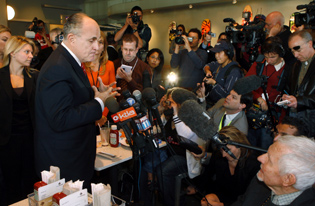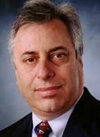| Home | Blog | Ask This | Showcase | Commentary | Comments | About Us | Contributors | Contact Us |

Washington-centric candidates and reporters: What’s missing here?ASK THIS | December 351, 2007Presidential candidates and the reporters covering them are out on the hustings all the time, but they often act as though government begins and ends in Washington. By Steven L. Katz and Paul L. Posner What do presidential candidates who have been mayors, governors, U.S. Senators or U.S. Representatives have in common with journalists covering the campaigns? The answer: They all have their backs to the states even when they are standing in them. Presidential campaigns are never active inside “the Beltway” and yet while the campaigns are out on the hustings, the candidates act as if the federal government is entirely Washington-centric. If we were to begin judging presidential candidates by their understanding of how the federal government really works – you know, the government that they will be elected to run – then their Beltway enclosed perceptions should disqualify any of the current presidential candidates. Certainly the former Mayor of Gotham City relied on federal laws, dollars, and programs to keep his city running. Current and former governors also know that their departments and funding are tied closely to federal agencies – from the EPA to the Department of Transportation. Most of all, current and former Senators and House members have authorized and appropriated for the needs of federal agencies and programs that are brought to life in states, territories, and local communities. Increasingly, Washington has been passing an ever growing range of mandates and rules for state and local governments with little or no funding. Whether it is No Child Left Behind or the Real ID Act, governors and mayors are being pressed to adopt a broad range of new federal initiatives and priorities. While the goals served by these mandates as advertised are hard to disagree with – education reform and national security for instance– the practice of enacting new programs without paying for the costs is a prescription for irresponsibility. The taxpayer must determine whom to hold responsible for the bill and often it is the governor or the mayor, notwithstanding the federal origin of these mandates. The federal government has also increased its preemptions of state and local governments’ regulatory authority in areas ranging from pesticides to taxation of Internet sales, often at the behest of national businesses that prefer dealing with a single government. While this is understandable, preemptions impose a one-size-fits-all regime that can undermine the ability of the states to develop new approaches to achieve complex public policy objectives. Add it all up, and the bottom line is that Washington has been engaging in a form of fiscal illusion for at least the past 50 years. New federal programs and promises are boldly made to match, but the federal bureaucracy has not been expanded to get the job done. Indeed, the numbers of federal civilian employees are lower than they were in Harry Truman’s time. States Are The Missing X Factor for Federal Mandates Political leaders have satisfied the paradox of American politics by giving us a stronger dose of national programs without the bureaucrats. The missing x factor is state and local governments, nonprofits and private contractors – they supply the emerging “shadow” federal workforce that is off the books and the national radar screen. Just as Washington exerts ever greater influence over programs and finances beyond the beltway, so do state and local governments play critical roles in determining whether and how national programs get implemented. The myriad federal policies, programs, funding, offices, employees, benefits, and services originate in Washington but run like a nervous system across the land. Most towns and cities, townships and counties, states and regions cannot make a move without being influenced by some federal program. Similarly, national program managers know that their initiatives are only as successful as state and local governments – and nonprofits and private contractors - want them to be. Viewed from out on the hustings, the states and localities are where the Federal government happens. Clearly, anyone running for President should not be able to run away from state and local governments. The American public deserves to have leadership that understands that the outcomes that matter to people are forged at the state and local level, albeit with greater national guidance and control. Journalists, Candidates, and the States Ironically, the failure of candidates to demonstrate an understanding of the role of the states while they are out on the hustings is shared with journalists -- who after one year of all out campaigning appear to have failed to ask questions of the candidates on this very subject. Journalists need to ask candidates the irksome but important questions: Q. What are the connections between Washington and communities and how well are they working to satisfy national and local values? Q. Do the candidates demonstrate a clear understanding of who will deliver on their promises and how this intergovernmental environment will affect nearly anything important the nation tries to do? Q. Do the candidates have a healthy respect for providing space to let state and local leaders work to satisfy the unique and differing needs of diverse communities across the country? Q. How do the candidates articulate the balance between the need for the nation to act and speak with one voice on certain issues and the flexibility required to address the unique needs of a diverse nation of states and communities? National Issues on the Hustings: What Questions Should Journalists Ask? The Wars in Iraq and in Afghanistan The National Guard and its reserves that are fighting, and will continue to fight, live and work in every state and territory of the United States. When they leave home, something from each state leaves with it – a family member, an employee, a member of the community, valuable resources, and the impact is significant at home. In regard to states and localities, what should journalists ask about the wars in Iraq and Afghanistan? Q. How will a President work with Governors, counties and mayors to fill the gap in emergency response left behind by the men and women of the National Guard deployed overseas? Q. Is there a backup force that the federal government should help support to fill the vital role played by the Guard in dealing with major disasters and terrorist events? Q. What role should the regular U.S. military play in working with state and local first responders in the case of truly catastrophic events? Border Security and Immigration In the most heightened sense, everyone’s front door becomes a border and a front, and the funding and policies must be sought by and implemented by the first responders at the police and fire stations down the street. Some proposals, in effect, require states and localities to join with federal officials in a national effort to verify identity and ferret out illegal aliens for possible prosecution and return to their countries. Immigration may be the “gay marriage” issue for Republicans of the 2008 election – the polarizing issue that is used to drive the wedge that candidates use to “put your trust in me and fear in the other candidates” – but are the candidates saying much that relates to the realities for legal and illegal immigrants and the contributions and needs-based impact that they might have on local communities? Washington’s ideas, good and bad, related to crises – even when Congress should deliberate longer instead of acting – lead to programs slipped into legislation like U.S. Representative Sensenbrenner’s (R-WI) Real ID Act. The driver’s license will become a de facto National I.D. Card, as the states will be forced to ask each of us to turn in our licenses to be converted to national identification cards. Then any official who ever looks at such an identification card will have be trained – it will likely be just as easy to create a fraudulent version that might pass scrutiny by a busy TSA official, as the current driver’s license or passport – though perhaps a new and expensive scanning technology might be invented and sold to the government to do this. What should journalists ask about Immigration? Q. What impacts will proposed requirements either requiring or preventing illegal immigrants from gaining access to public services have on state and local communities? Q. How will requirements to partner with federal immigration authorities in ferreting out illegal aliens affect local governments’ relationships with immigrant communities? What should journalists ask about National ID? Q. How will we pay for the new ID which state groups estimate to exceed $11 billion? Q. Some states are in the process of creating a secure ID through collaboration among the state motor vehicle agencies. Should we let this go forward, at far less cost than a national ID card? Q. How will the federal government work with states to satisfy requirements to verify the new state ID by checking federal records? Q. How will personal privacy be protected in what amounts to a de facto national ID card? The Economy Federal tax and budget policy creates the fundamental context for anything that government can do at all levels. As the federal government faces yawning budget deficits, state and local governments may be asked to shoulder greater responsibilities for programs heretofore financed through federal grants. Anxious federal officials may increasingly espy a national sales tax, with untold implications for states that rely on these revenues to finance much of their operations. Even absent new federal policies, the General Accounting Office has concluded that state and local finances are unsustainable over the longer term, thanks in great part to the growing obligations states have to share in the Medicaid program, the nation’s health safety net and long term care program. Moreover, those costs are not spread equally – the poorest states and communities both have the highest needs and the lowest capacity to finance those needs through their own tax bases. What should journalists ask about the Economy? Q. Fiscal coordination – have candidates thought to screen their fiscal policy proposals to test their implications for state and local sector? How might they work more collaboratively with state and local governments to develop more cooperative solutions to vexing fiscal challenges? Q. Fiscal disparities – profound differences separate the financial capacity of our nation’s communities. The local governments with the highest needs for public services are often those with lowest incomes and least capacity to raise tax revenue to solve their problems. Is there a federal role in assisting the nation’s poorest communities and what would this look like? Q. Tax policy – have candidates thought about where the money will come from to finance the baby boom retirement and health care costs and what the impacts might be on state and local governments? For those candidates with proposals for new national consumption or sales taxes, what impact do they foresee for the state and local sector? The Environment EPA largely operates through the states that enforce federal standards in such areas as air quality, water and other media. Some states have used their position in the federal system to become the drivers of new policy innovation in these programs, most notably in the area of global climate change policy. While states have argued that regulation of carbon dioxide is covered under their delegated authority to manage clean air programs, the current Administration disagrees. States have also worked to exceed federal standards and develop new policy in such areas as nonpoint source water pollution and energy conservation standards, at times with the opposition of the business community. What should journalists ask about the Environment? Q. Should states be permitted to engage in policy expansions under federal programs as long as they meet minimal federal standards? Q. Specifically, should states be permitted to develop their own standards for carbon emissions from automobiles or should there be a single federal standard adopted by the federal government? Q. Under what circumstances should the federal government preempt states’ regulations of business in the environmental and energy area? Education and the No Child Left Behind Act The federal government has seriously upped the ante on education through the No Child Left Behind Act of 2001. Previous federal programs were focused on improving service to disadvantaged groups, but this new initiative went far beyond any previous federal program in an action that would have made even Lyndon Johnson blush. Unlike previous programs, this initiative nationalizes the agenda for the nation’s schools. Not only are states and local school districts required to institute new testing, but federally mandated consequences accrue for those schools failing to pass muster. No Child Left raises the question whether a president should be the Chief School Superintendent for the Nation – and what happens when one tries? State and local school officials are no longer the final arbiters of school quality and results, as Presidents and members of Congress have now placed their imprint squarely on one of the most quintessential local institutions in our system. What are the questions journalists should ask about Education? Q. Is a framework requiring 100 percent compliance feasible and what are the binds that such regulations place on state and local leaders? What effects do such rules have on teaching and are national leaders prepared to deal with such consequences? Q. Are there alternative models for national leadership of our education system that promote equity without the costs and conflict inherent in NCLB? Q. What will the candidates do with the controversial No Child Left Behind Act when they enter the White House? Candidates Debate the States 2008! Like the Thrilla in Manila, let’s have Presidential Candidates Debate the States – and have the first presidential debate in which the candidates face a panel of local officials who ask the questions. Let’s have a moderator be a governor, mayor, or maybe a social studies teacher or head of a local nonprofit moderate because they understand the questions – and the journalists can watch, learn something, and then start following up.
|





